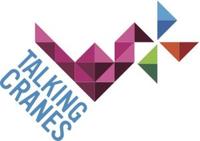Aneeta Madhavan, co-founder of Talking Cranes

Aneeta Madhavan is Co Founder of Talking Cranes, a Diversity & Inclusion start up working with companies to develop, advance and retain talent from diverse backgrounds and experiences. Solutions include a mix of workshops, webinars, creating online communities for peer learning and expert coaching. Talking Cranes operates in the UK, US and India. Aneeta is also an Executive & Leadership Coach, deeply committed to helping her clients move forward in their professional lives.
What is your background? What made you decide to get involved in supporting entrepreneurs?
I was at a point where I had done as much as I could in terms of working for someone. I wanted to step off the corporate ladder to do something more meaningful and impactful. I have 3 decades of experience working across the world in tech and publishing, building businesses from the group up and holding leadership positions. My Co founder and I knew from our own experiences as well as global leaders we had discussions with that despite women having been in the workforce for decades, there were very few in leadership. That despite women influencing up to 80% of global spending power, they hold few positions of power, influence or trust. We launched Talking Cranes to change that and create new bases of power, influence and trust.

To me, entrepreneurship is about coming up with an idea to disrupt the status quo, having the courage and self belief to leave a safe job and career to execute the idea and the tenacity to hang in there through the rollercoaster ride.
How and when did you know your idea was good enough to develop it?
We did our research and launched the beta version in 2012-2013. It began as a side hustle when we were still in full time jobs. The beta helped us refine and focus on the specifics that pivoted and evolved over the years.
What would you say are the top 3 skills that needed to be a successful entrepreneur? Why?
I would say courage, creativity and networking are the top three skills that are needed to be a successful entrepreneur. It takes courage to launch and execute an idea. It takes creativity to pivot and adapt – what you begin with often changes and you need to be creative in being able to spot the gaps in the market and adapt your idea to fit market needs. Entrepreneurship does not happen in a vacuum. Being able to intentionally build a network to help you navigate your way through your journey as an entrepreneur is an essential skill. As they say your network is your net worth.
What is your favourite part of being an entrepreneur?
My favourite part is being excited about what I am doing and having a sense of purpose. That I am making an impact is very rewarding.
What individual, company or organization inspires you most? Why?
I particularly admire Kike Oniwinde, the young & purpose driven founder of BYP Network. I am blown away by what she is doing. By building a global network of Black professionals, she is changing the narrative around how the Black community is perceived. Not only is what she is doing incredibly inspiring, but it is also a sound business idea. She has managed to combine the two and do amazing things for the community.
If you had 5 minutes with the above individual/ company/organization, what would you want to ask or discuss?
I want to support her vision and mission. I see many overlaps between BYP Network and Talking Cranes and would love to work more closely with her.
What has been your most satisfying or successful moment in business?
Hearing from our user group about the impact our work is having.
What would you say have been some of your mistakes, failures or lessons learned as an entrepreneur?
In the early years we dissipated our energies in implementing our idea in different parts of the world. It would have served us better to have focused on building & marketing the idea in one region and then rolling it out in other parts of the world.
How have you funded your ideas?
Bootstrapping, friends and family round
Are there any sector-specific awards/grants/competitions that have helped you?
No, we did it all by ourselves.
What is good about being an entrepreneur in Oxfordshire? Bad?
I have been based in Oxford for 29 years. For one, Oxford is really well positioned. It is close to London, which is a hive of activity. It is close to Heathrow, which was great as I travelled quite often pre-COVID. It is also well connected to other major cities. I hadn’t realised until quite recently that there is so much entrepreneurial activity in Oxford, there is an ecosystem here that can be leveraged.
If a new entrepreneur or startup came to you looking for entrepreneurship resources, where would you send them?
I am an executive & leadership coach & work with entrepreneurs too. I always focus on their unique needs and then link them up to relevant resources or introduce them to my network if needed.
Have you faced any challenges as a woman entrepreneur? If so, how have you overcome them?
Getting funding has been massively challenging as a woman, the fact that I am older and a woman of colour hasn’t helped either. People like to invest in those that fit the profile of the traditional person or group they would invest in – stereotypically the young, well-educated white male. If you lie outside of this traditional category, it can be very difficult to secure funding. We had to scale back a lot of our plans due to the lack of external funding. Also, ten years ago, diversity in leadership was not on people’s horizons. We were ahead of the curve and raising funding in that environment was difficult. We overcame that by bootstrapping and going to friends and family. Any revenues we realized from our venture we reinvested in the business.
What resources would you recommend for other women?
Networks have helped me immensely, both online and in-person. Women’s networks have also been very useful. I also subscribe to research led publications in my field, attend conferences (being online now, it’s so much easier & less expensive to attend) & consume content to help me keep on top of my learning. Keep learning, it is so important in order to help your business grow.
How could institutions such as the University of Oxford better support women entrepreneurs?
They could provide funding, support networks, mentoring and coaching.
Do you have any advice specifically for other women who want to be entrepreneurs?
Being an entrepreneur can be lonely and stressful. So make sure you have support networks as well as a mentor (s) that you can call on for advice and a coach who will ask you the questions that will help you grow and flourish. A solid co founder who complements your strengths is not only great for the business and your sanity but also quite critical when you are looking for funding. In my experience, funders invest in teams and preferably headed by cofounders who work well together.
Any last words of advice?
Go for it. Be ready for your first idea to fail. Don’t however view it as failure but use your learning from the experience as a stepping-stone to getting it right next time. Don’t be shy about leveraging your networks and do the ASK.
Share this
More news



